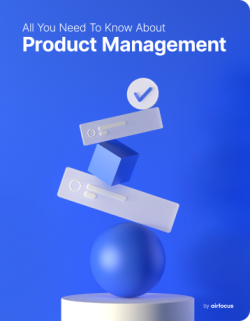The Ultimate Guide To Hiring a Successful Product Manager (+17 Insightful Interview Questions)

Ready to hire your new product manager?
Bad news: you might not be as ready as you think.
Why? Because you don’t need just any old product manager. You need the product manager that’s going to take your product to the next level.
But hiring that special person with the skills to deliver takes time, planning, and hard work.
Especially if you don’t have a clearly defined process for hiring a product manager for your company.

You need to understand exactly what the role involves. And we’re here to help.
In this piece, we’ll look at:
What does a product manager do?
How much does a product manager make?
What makes a good product manager?
How should you prepare for a product manager interview?
Which questions are the most important to ask candidates?
What Is The Role Of A Product Manager And What Does A Product Manager Do?
So. The million-dollar question.
What does a product manager do?
The definition is fairly straightforward: a product manager is responsible for any product throughout its lifecycle, guiding it to success.
But just because the explanation seems simple doesn’t mean the job is. Product management can be incredibly tough, primarily because it’s so varied.
The key responsibilities of a product manager
Before we dive into the specifics of how to hire a great product manager, we’ll first take a quick look at what they actually do.

One of the first things a product manager does is to define a clear vision and strategic direction for a product. To do this, they need to know:
Who’s the product for?
What pain points is it addressing?
Why should users care?
How does it add value to the user’s life?
Which are its main competitors (if any) and how is your product different?
These questions are crucial to develop a product capable of making a positive impact on the market.
That is why a great product manager invests considerable time, energy, and resources into continuously defining these points.
They have an analytical mindset and are comfortable taking on tricky negotiations to make sure the user’s best interests are met.
They might conduct research across various channels and demographics to inform the product’s vision.
Maybe they survey consumers from the target audience (based on age, income, location, occupation, etc.) to identify unmet needs.
Perhaps they compile a list of requested features or complaints.
It’s a lot of work …
However, it pays off when a well-informed, well-researched product manager puts this data to good use.
Stakeholders, company directors, and development teams should all feel motivated by the strategic direction that the product manager sets.
Obviously, communication is a big deal here. That is why solid interpersonal skills are such a core component of a great PM.

Each team should be working towards bringing the best product it’s capable of to consumers. A missed update or crossed wires could cause mistakes, oversights, and delays.
Costly delays. The kind of delays that set the product launch back by weeks or months.
Product managers, therefore, have to keep teams aligned and working harmoniously. They are forward thinkers, and effective.
In short: your product manager creates and maintains the structural integrity of a product’s development. They prevent the design, production, and release phases from becoming an unholy mess.
How Much Does a Product Manager Make In The US And Europe?
How much does a product manager make? is a pretty open-ended question. Payment for product managers in different industries (healthcare, software, telecommunications, etc.) varies.
The average salary for a product manager in the US is between $46,000 and $200,000 (for those in senior positions). Bigger companies have higher budgets with which to compensate workers, particularly those helping to bring valuable products across the finish line. Your business may struggle to offer anything close to these figures.
How about throughout Europe?
Well, German companies hiring product managers will pay around $70,000 on average. Product managers in Denmark may earn around $100,000, compared to $65,000 for those in Ireland. In the UK, product managers can expect to earn around $65, 687 (£50,000) on average.
Asking how much does a product manager makes is a critical step in hiring your own. You have to consider the sheer amount of work you expect them to do in bringing products to market successfully.
They’re responsible for wrangling teams across different departments and putting plans into action to align those teams.
The best candidates will bring years of experience to the role. And this means they’ll expect to be well-compensated for their value.
It may be tempting to play hardball and try to negotiate the lowest rate possible, but this is hardly the best way to start a productive relationship.
Be flexible with your product manager's salary. Be open to discussion. The right candidate will know their worth — and you should, too.
Hiring a remote product manager
70 percent of people work remotely once per week or more around the world.
The proliferation of online productivity platforms, project management software, and product management tools empower professionals with the flexibility to work almost anywhere.
And this is why you don’t need to hire a product manager who’ll come into your office. You can avoid these overheads and hire a candidate remotely instead.
Furthermore, you open your business up to the global talent pool.
You’re not restricted to the candidates in your local area — you can scour the world to find the best person for the job.
Working with a remote manager is convenient, cost-effective, and almost as simple as it would be if they were in your office. There are, of course, some challenges, but these are easily surmountable (here’s some advice on that point)
The latest product management tools allow PMs to create roadmaps and prioritize tasks with ease, no matter their proximity to the key stakeholder.

They can interact with employees via real-time messaging or Slack, host video conferences with stakeholders, and stay up-to-date with a product’s lifecycle without missing a beat.
The process of hiring a remote product manager is similar (if not identical) to hiring one in-house.
All the required skills are the same.
All the key tools and processes are the same.
But meeting with them is different. You’ll need to speak with them by phone, by video chat, by email. This may be unusual if you’ve never employed remote workers before, but you’ll acclimate to it sooner than you expect.
Geography no longer needs to be an obstacle when hiring employees. So, don’t let it stand in your way.
What Makes A Good Product Manager?
So, what makes a good product manager?
We dive into this in much more detail in this post, but here are the headlines.
Strong communication skills and an ability to engage with people at all levels
A good product manager needs to navigate discussions with developers, designers, stakeholders, marketers, retailers, and others regularly.
Being able to communicate ideas, concepts, plans, goals, and issues in a clear way is fundamental. This is especially important when dealing with stakeholders who know nothing about how a specific product works or its target audience.

Getting decision-makers on-side is also crucial to drive success, and the best product managers can do this with even the most revolutionary or obscure ideas.
But there’s more to communicating effectively than sweet-talking the people at the top.
Product managers interact with workers at every stage of a product’s lifecycle. They should know how to articulate their thoughts and direct others down the right path to achieve goals.
Speaking clearly and honestly is key. And so is motivating people to perform at their best.
Just as product managers need to determine the purpose and value of items before putting them into production, they’re responsible for keeping workers focused. This is easier with some people than others.
A good product manager knows this. Any candidate who struggles to communicate during the interview or answer your questions is unlikely to be the perfect fit.
An ability to grasp complex ideas and processes fast
Product management can be a technical process. Particularly within technology brands or those which leverage cutting-edge systems every day.
A product manager has to adapt to new ways of working and techniques quickly. This doesn’t mean they should be a technical wizard and spend every waking minute honing their skills.
But it does mean they’re willing to learn.
One solid technique is to ask employees to introduce the new product manager to everything they need to know to get started.
This might not be an in-depth breakdown of every tool and every product. Instead, they could just give the manager enough to hit the ground running.
The more well-versed your product manager is in your business, goals, and working methods, the more likely they are to deliver a product that shows your brand at its best.
An eye for analytics
Studying data helps product managers understand the market, assess the past performance of similar goods, compile comprehensive reports for stakeholders, and mine product analytics for consumer insights.

The right product manager for your business should have an analytical mind and know how to pull valuable information from fields of data. Their superior communication skills will help them translate complex details into a language everyone understands. too.
A passion for organization
An ability to plan ahead and create a tight structure for a product lifecycle is vital. Product managers are responsible for keeping teams on-track to hit their goals efficiently.
So, if they can’t stay organized, how are they supposed to help others stay organized, too?
Your product manager should have experience in using dedicated roadmapping tools and overseeing projects. They need to know how to identify the most important tasks in a list of many, and put plans into place to transform ideas into a reality.

This includes chairing prioritization meetings and creating talking points to minimize wasted time. A good product manager knows every minute counts and prevents unnecessary distractions from disrupting work.
No task should go on longer than it has to. This applies to everything from meetings with stakeholders and feedback sessions to discussing release plans with marketers.
One last thing before we move on: don’t stick too rigidly to your own standards when looking at applicants’ resumes.
Yes, having firm expectations for the perfect candidate is a major help. But if you decide to eliminate anyone who lacks a college degree or experience in a specific field, you might end up overlooking people capable of doing a fantastic job regardless.
Be willing to take a chance on interviewing candidates who don’t necessarily have everything you’re looking for, but still have plenty to recommend them.
How To Prepare For A Product Manager Interview: The Questions You NEED To Ask
You put ads for your product manager vacancy out there.
You wait for applications to roll in.
You find yourself sitting opposite a highly-qualified, experienced, ambitious candidate in the interview room.
And you have no idea what to ask.
How do you think this makes your business appear to your prospective employee? Do you think the best candidates will be desperate to join your team or will they look elsewhere?
More than 30 percent of managers claim they can determine whether they’ll hire someone within 90 seconds of starting an interview. But you need to spend a little more time on them and dig a little deeper to understand whether they’re ideal for the role or not.
And this gives them a chance to consider if taking the job is the right move for them, too. So, which product manager interview questions should you ask? Here’s a list of tried and tested questions that really help you get to the heart of your candidate’s capability and mindset.
Let’s dive in:
1. Think of a product you use every day. If you were given the chance to improve it, what changes would you make and why?
2. You have multiple tasks to accomplish but can’t do both in the time available. Can you explain what steps you’d take to prioritize them and identify the most important?
3. What are the common features of a well-designed product, and why?
4. Think about the most successful product that comes to mind, in any area. Why do you think this has made such a big impact?
5. What product management tools have you used in previous product manager roles, and why should we implement them here?
6. Can you provide an example of a time when your involvement helped a team complete a product faster, and explain how you achieved this?
7. How would you communicate technical ideas to stakeholders who have no prior knowledge or experience of an upcoming product?
8. Can you cover three factors you think are key in motivating teams to stay on track and perform at their best?
9. What steps would you take to improve the way in which our teams communicate with each other and collaborate?
10. When have you had to adapt your working methods or approach to communication to cultivate stronger relationships with teams or individuals?
11. How would you try to help two or more stakeholders disagreeing over an idea reach a compromise?
12. Have you ever been unable to drive a team to complete something on time, and if so, how would you approach the same situation now?
13. Why are you the right person for this job?
14.What’s the toughest decision you’ve had to make in product management?
15. How would you tactfully tell someone their idea wasn’t right for a product, especially if they were clearly unlikely to take it well?
16. If you could go back and handle any professional situation differently, what would it be and why?
17. Which aspects of product management have you found to be the most and least rewarding?
Asking these questions will give you an insight into the type of person your prospective new product manager is. You want to know as much about their experience and their practical, hands-on knowledge of managing difficult situations as you can.
When hiring remote product managers, you’ll no doubt conduct one or more video interviews. Be sure to allocate enough time to ask the above questions and have a general chat.
You should end an interview feeling as if you know what working with the applicant would be like, and whether their personality aligns with:
Your business goals
Your company culture
Your current workforce
Your established processes and methodologies
Treat the interview process seriously and be thorough. Make time to ensure the candidate is trained in your preferred software and tools properly. Help them integrate with the rest of the workforce and establish a positive working relationship with their new colleagues.
A good product manager can make sure your products reach their target audience smoothly, on time, and with the right amount of fanfare. Invest all the time, energy, and resources you can spare into finding the ideal candidate for the role. You’ll get the rewards you’re looking for down the line if you make the right choice.

Andrei Tiburca

Read also



Experience the new way of doing product management

Experience the new way of doing product management





